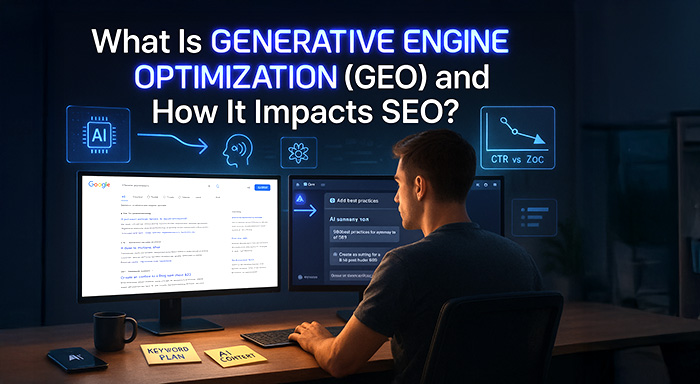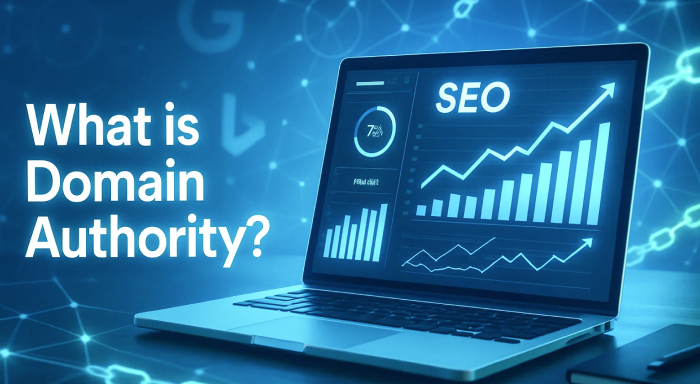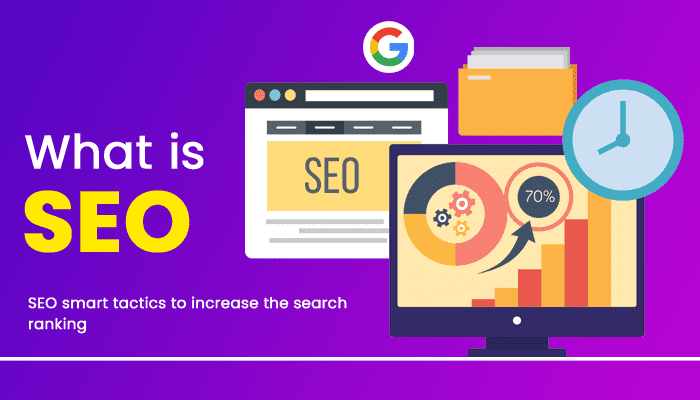If one thing is true about digital marketing, then it is the fact that it never stays stagnant. It is always moving and evolving. In order to remain competitive, being up to date with recent market trends and developments is a core necessity. In the digital marketing space, the latest innovation that has taken everyone by surprise is Generative Engine Optimization. It has completely redefined the way people look up and interact with information online. But what is GEO? How it works? Is it different from SEO? Does it impact SEO? Let us try to answer all these questions in this blog in detail.
The basics covered in this blog will enable you to stay ahead in the market and traverse the evolving digital marketing landscape with ease.
What Is GEO ?🙄
GEO is an acronym for “Generative Engine Optimization.” It refers to the process of optimizing the content of your website to enhance its visibility in AI-driven search engines. GEO strategies can make your content appear in AI search results on platforms such as Perplexity, Claude, ChatGPT, Gemini, Microsoft Copilot, Meta AI, etc. It is the strategy that makes your brand visible in AI-driven results. It basically means that whenever users search for the services, products, or expertise that you offer, GEO strategies can help you show up in the results.
What Is the Significance of GEO?
As you know, the search behavior of GEO is evolving. Thus, brands must continuously look for ways to improve their visibility in AI-driven results. GEO strategies can allow you to be more discoverable in AI platforms. It enables you to make AI platforms a new addition to your marketing channels. Not only does it help you be more seen, but it also enables you to engage your clients, customers, and audience in a new and innovative way. You must be seen irrespective of where your audience is trying to search your services.
The excitement around AI has now taken the shape of stabilizing reliability. As technologies are advancing and maturing, people’s trust in them is also increasing. Thus, appearing in AI-generated search results naturally improves your credibility as well. Once, Google was an undisputed leader in internet searches. However, its market position is now being challenged by prominent platforms such as Perplexity, ChatGPT, xAI, Claude, etc. Let us quickly study a couple of important points-
Impact of GEO on Organic Search
Needless to say, AI has successfully transformed the already competitive landscape of organic search. It has made businesses reconsider their marketing approach and strategies. As per the report from Gartner, the world will see as much as 25% drop in conventional search engine volume by 2026. Thus, it will naturally bring down the organic search traffic by nearly 50% as consumers start to trust AI-enabled search more.
Around 70% of consumers are already using AI platforms for random searches. A lot of them even trust it. So, are we saying that the SEO is dead? The answer is no. However, in the coming future, the conventional SEO tactics will not be sufficient. It is important for businesses to adjust well and incorporate GEO in their marketing strategies as well. GEO is significant if businesses need to maintain their visibility in search engines.
Evolving Search Behavior of Users
Since the introduction of ChatGPT, the way people search and consume data has drastically changed. A lot of users trust these AI chatbots to look for products, information, and purchases. As of August 2025, ChatGPT alone caters to around 800 million active users on a weekly basis. Even a less popular platform such as Perplexity has amassed over 100 million queries in 2025 alone. The data indicates the evolving reliability of these platforms. With consistent upgrades and iterations, they have also elevated their capability to render personalized, accurate, and relevant information.
With growing capability and reliability, you can expect more people to start using these platforms for web searches. Through GEO, you can optimize your content to appear in these AI platforms. Thus, you can meet people irrespective of wherever they are searching for information. By making your content relevant to the user’s search queries, you can improve your traffic and stay visible in the market.
What Are the Advantages of GEO?
The key advantages of Generative Engine Optimization are explained as follows:
Improved User Experience:
GEO helps you make your content relevant so that AI can select it for quick and personalized answers. As you know, AI chatbots understand user intent and context in a much better way. As a result, they are in a much better position to provide highly tailored and pertinent results. Hence, an effective GEO strategy empowers you to ensure user satisfaction and boost brand loyalty.
Enhanced Reach:
Incorporating GEO strategies widens your reach and helps you attract more visitors. It helps you to think beyond conventional search engines. As users switch to AI chatbots for web searches, optimized content helps you make sure that you can reach out to a wider audience.
Competitive Advantage:
Since GEO is still a relatively new term in the market, not many brands have woken up to it. Thus, an early adoption can differentiate your brand from the rest and position you as a futuristic brand.
Credibility and Brand Authority:
Content optimization for platforms can help you establish your brand as a reliable source. As stated earlier, if your brand shows up organically in the AI search results, it will naturally improve your results. This is because AI chatbots extracts content from multiple sources and the appearance of your content in AI search results showcases its quality and your brand expertise. Furthermore, you can even optimize your content based on demographics to make sure that AI represents your content to the right audience. This can reinforce the authority of your brand.
Data-based Insights:
Effective GEO strategies also provide you with detailed metrics and insights to fine-tune your strategies and enhance engagement. Through these metrics, you can gain an in-depth understanding of how users engage with your content. The data helps you make informed decisions and refine strategies. Data can not only help you boost your content relevance but also meet distinct user requirements. Thus, you can adopt a more comprehensive approach to garner higher levels of engagement.
How Is GEO Different from SEO?
SEO is Search Engine Optimization and deals with content optimization for the audience and search engine crawlers. On the other hand, GEO adopts a lot more holistic approach. It factors in the nuances of AI models, how they process data, and how they understand search queries.
There are core differences between the two and are explained as follows:
AI Focus: GEO emphasizes content that can be easily processed by AI models and can easily answer AI search queries.
Natural Language: The main difference lies in the use of conversational tone and natural language. In GEO, the content must be more engaging and human-like for both AI as well as users.
Semantic Search: Instead of keywords, GEO relies a lot more on semantic search. It refers to the interpretation of intent and context behind every search query.
Iterating Algorithms: In GEO, you will have to deal with evolving algorithms. GEO must adjust to the latest development and updates related to AI algorithm and advancement.
By understanding the main differences between the two, you can optimize your content to incorporate both strategies. By adopting both SEO and GEO principles, you can widen your reach and target a broader audience.
What Factors Impact GEO Results?
Since GEO is a lot different from SEO, what factors do we need to focus on? Let us explore them in this section-
Quality of Content: Just like SEO, content is king in GEO as well. Focusing on informative, top-quality, and engaging content is vital for attaining top visibility in AI search results.
Keyword Relevance: Understanding the phrases, prompt engineering, important keywords can aid you in making your content relevant for AI search queries.
Website Authority: This is where SEO is related to GEO. If your SEO metrics like DA, DR, backlink profile and Spam Score are good, AI chatbots naturally consider your website to be reputable. This can make them be more willing to share your content.
UI/UX: A simple and elegant website attracts visitors from all corners. Moreover, factors like easy navigation and quick loading times can also play a crucial role.
Focus on Semantic Search: In GEO, you must move beyond focus keywords. You must understand the context and intent behind the keywords. Strategically incorporating related synonyms, related terms, and even AI search queries can drive better results.
Focus on SFW (Safe for Work): Since AI chatbots have strict content moderation platforms, avoid publishing, promoting, or even linking NSFW (Not Safe for Work) websites.
Secure HTTPS: Implementing HTTPS positively impacts your GEO as well as SEO. Advanced security measures make a profound impression on both search engines and AI chatbots.
Garner Good Customer Feedback: Advanced AI algorithms consider multiple factors before recommending a website to a user. If you have managed to garner good reviews on diverse platforms, then you have a higher chance of showing up on AI search results. For example, you must be positively reviewed not only on Google, but also on Glassdoor, LinkedIn, etc.
AI Search Queries: In GEO, you must focus on how AI search queries are constructed or engineered. Keep in mind that search queries are relatively higher in AI chatbots than they are in search engines. Hence, a higher understanding of prompt engineering principles can help you make your content more GEO-optimized.
Conclusion
We can conclude that Generative Engine Optimization (GEO) is not really a replacement or disruptive innovative for SEO, but just an evolution for you. As AI-powered platforms such as Claude, ChatGPT, xAI, and Perplexity modify how users look for information, GEO can allow brands to be visible, relevant, and competitive. In simple terms, just like SEO, GEO is an ultimate strategy to take your website visibility to the next level. Through GEO, not only can you boost your website traffic, but also increase your conversion rate.
The blog explores GEO in detail. For more digital marketing-related articles, explore our website.








